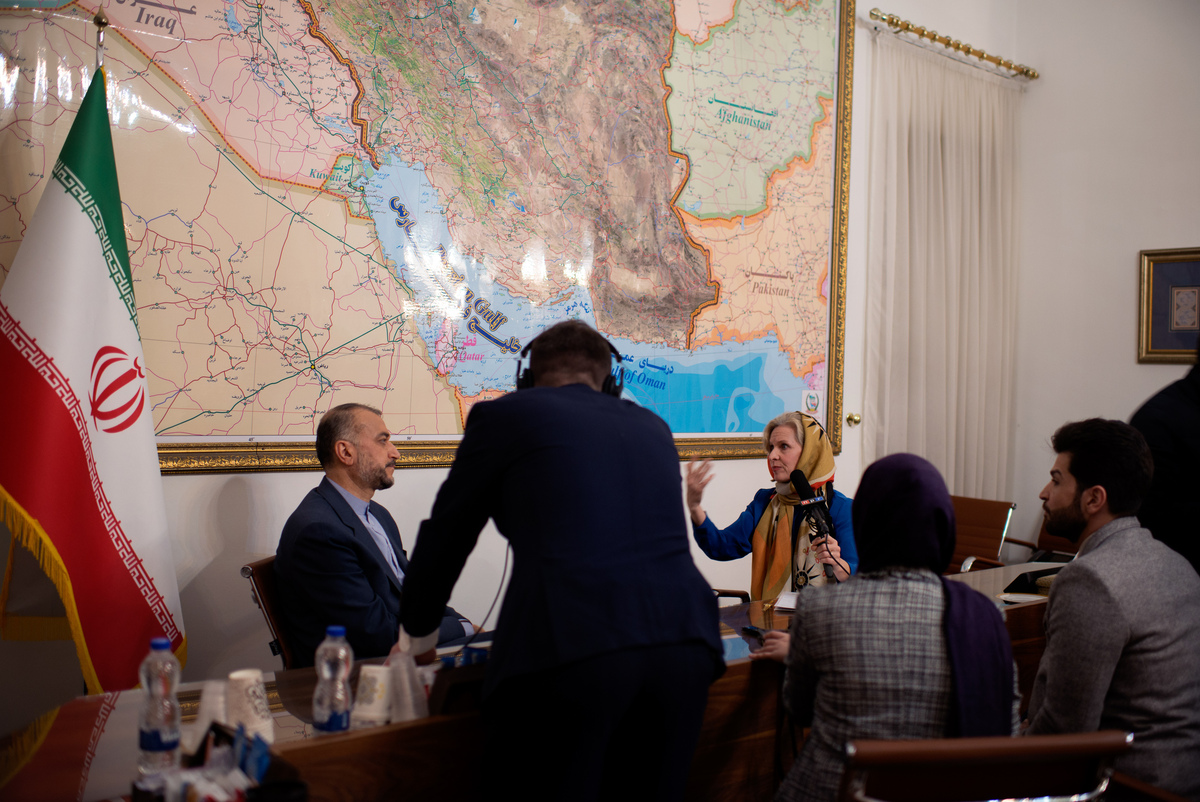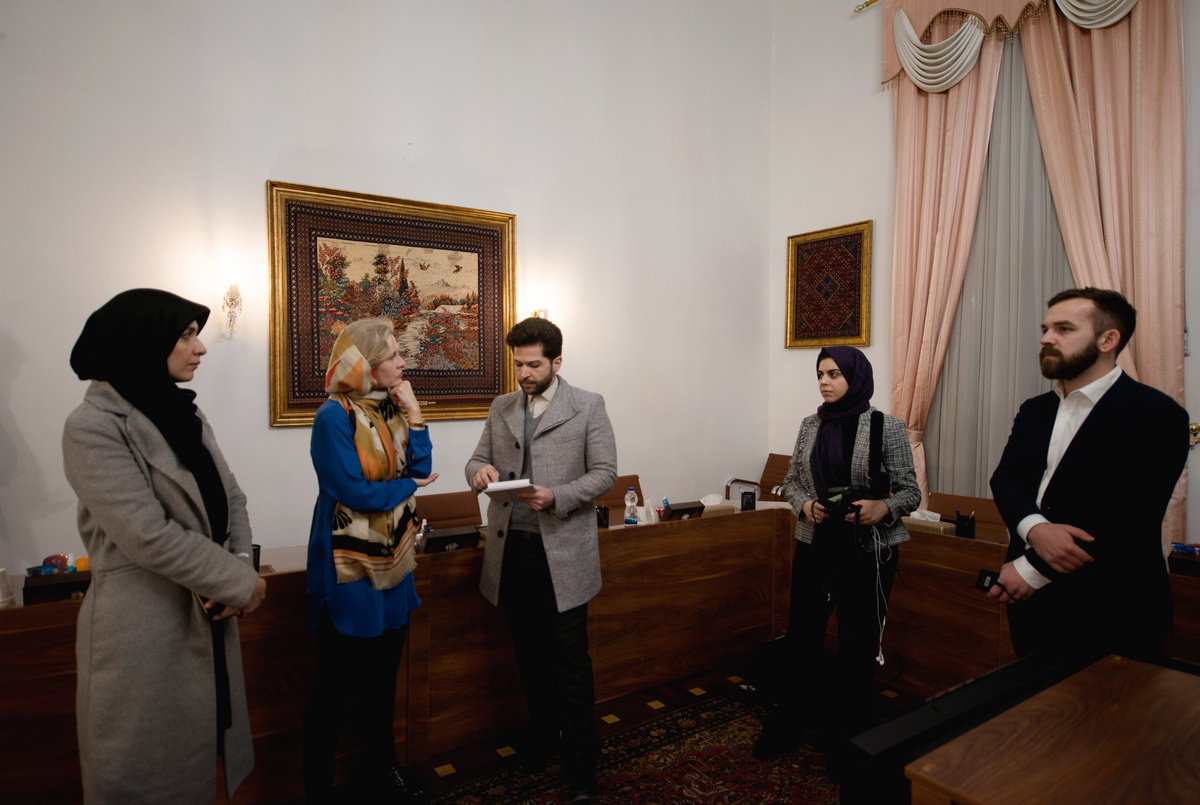
[ad_1]

NPR’s Mary Louise Kelly interviews the Foreign Minister of Iran, Hossein Amir Abdollahian, in Tehran.
Marjan Yazdi for NPR
conceal caption
toggle caption
Marjan Yazdi for NPR

NPR’s Mary Louise Kelly interviews the Foreign Minister of Iran, Hossein Amir Abdollahian, in Tehran.
Marjan Yazdi for NPR
TEHRAN, Iran — Months after the dying of Mahsa Amini, a deep-seated sense of anger and desperation persists within the streets of Tehran, even because the protests that rocked Iran have diminished.
The protests erupted after the 22-year-old Kurdish-Iranian lady — recognized to household as Jina — died in police custody in September, after being detained for allegedly sporting a scarf improperly. What began as anger at her dying shortly grew right into a motion led by younger Iranians, who took to the streets to air their wide-ranging grievances in opposition to Iran’s rulers.
NPR heard these grievances in dialog with individuals on the streets of Tehran, who stated life in Iran generally felt not possible. They described an financial system through which primary wants like meals and drugs are punishingly costly, unemployment is rampant, and a restricted web has left them feeling minimize off from the world.
Some blamed U.S.-led sanctions, however many accused their very own authorities of mismanagement and brutality.

Iran’s Foreign Minister, Hossein Amir Abdollahian, in Tehran.
Marjan Yazdi for NPR
conceal caption
toggle caption
Marjan Yazdi for NPR

Iran’s Foreign Minister, Hossein Amir Abdollahian, in Tehran.
Marjan Yazdi for NPR
According to human rights teams, the federal government killed tons of of protestors in its response, and jailed hundreds. In December, the federal government started executing individuals concerned within the protests on expenses starting from assault to homicide.
Four individuals have been put to dying thus far and at the very least 14 extra have obtained dying sentences. The United Nations High Commissioner for Human Rights stated final month that the executions violated due course of and amounted to “state-sanctioned killings.”
In an interview with NPR’s Mary Louise Kelly, Iran’s Foreign Minister, Hossein Amir-Abdollahian — talking by way of his interpreter — dismissed the impression of the protests, referred to as the demonstrators “rioters,” and stated that “nothing important had happened.”
The protests
Amir-Abdollahian denied stories that the federal government had arbitrarily detained tens of hundreds of individuals. He stated that everybody who had been detained within the protests “played a role in the riots on the streets” and stated tons of, not hundreds, had been detained.
He brushed apart photographic evidence of protester injuries compiled by human rights activists. “We have seen the very same pictures,” he stated. “But the question is, who has, in fact, fired those shots: the police or the rioters?”
“Israeli and American armaments came through from some of our neighboring countries,” he stated, and got to the “rioters.” And he stated that police who responded to the demonstrations weren’t allowed to hold firearms. However, human rights teams have documented safety forces utilizing weapons in opposition to protesters and firing in crowded areas.
Amir-Abdollahian additionally criticized statements from U.S. officers in assist of Iranian protesters. He referred to as them interventionist, mistaken and “tantamount to interference.”
Freedom of expression
The international minister maintained that “people can freely voice their ideas” in Iran. Asked about Iranians who declined to talk to NPR, citing concern of authorities and pointing to CCTV cameras, he joked, “You could have interviewed them in a blind spot.” Later he stated that there are only a few cameras on the streets in Iran, which contradicts the observations by NPR journalists in Tehran this week.
Asked in regards to the greater than 90 journalists that the Committee for the Protection of Journalists (CPJ) said have been detained since the start of the protests, Amir-Abdollahian stated “no journalist was detained during riots.” He advised that they might have been “re-labeled” as journalists after they had been detained for another offense.
In reality, a sampling of the names on CPJ’s checklist shortly reveals journalists who labored for well-known shops in Iran. They embody Niloofar Hamedi of the Shargh Daily newspaper and Elahe Mohammadi of the state-run Hammihan Daily — two of the journalists who helped break the story of Mahsa Amini’s death.

The NPR group — Mary Louise Kelly (second from left), and (proper) Fatma Tanis and Connor Donevan — put together for the interview.
Marjan Yazdi for NPR
conceal caption
toggle caption
Marjan Yazdi for NPR

The NPR group — Mary Louise Kelly (second from left), and (proper) Fatma Tanis and Connor Donevan — put together for the interview.
Marjan Yazdi for NPR
Nuclear deal
On the demise of the 2015 settlement that gave Iran sanctions aid in return for limits on Iran’s nuclear program, the diplomat pointed to the U.S. pulling out of the deal. The Trump administration broke the deal in 2018 and reimposed sanctions. Iran then began breaking the settlement’s limits on nuclear exercise.
According to the pinnacle of the International Atomic Energy Agency, Rafael Grossi, it has now amassed sufficient extremely enriched uranium to construct a number of nuclear weapons. But Amir-Abdollahian stated that didn’t imply Iran was making an attempt to construct a nuclear bomb.
“In order to respond to wrong American behavior and within the framework of reciprocity, we leveled up our nuclear activities at home,” he stated. “However, when it comes to our beliefs and values, we do not pursue the making of a nuclear bomb.”
The Biden administration needs to revive the nuclear deal. But negotiations have been at a standstill, and the deal’s future hangs within the stability, with U.S. officers expressing low confidence in Iran’s willingness to revive the settlement.
“There is confusion within the White House,” stated Amir-Abdollahian, accusing the U.S. of hypocrisy and blended messaging. “If you want to return to the deal, why do you say one thing to the media and the other through our diplomatic exchanges?”
He expressed Iran’s need to return to the deal however added that “the window of opportunity will not be open forever.” Meanwhile, U.S. officers say that amid condemnations within the West over Iran’s dealing with of the protests and because it helps Russia’s invasion of Ukraine, this isn’t the time to revive the nuclear deal.
The international minister additionally mentioned the negotiations over the discharge of Siamak Namazi, an Iranian-American who was detained in 2015 and has been in Tehran’s Evin jail. Namazi is one among at the very least three U.S. residents at present held in Iran.
“We’re ready to exchange prisoners,” Amir-Abollahian stated, including that negotiations had been ongoing however that there have been “technical steps that need to be taken by Americans.” He didn’t elaborate on what these steps had been.
[adinserter block=”4″]
[ad_2]
Source link